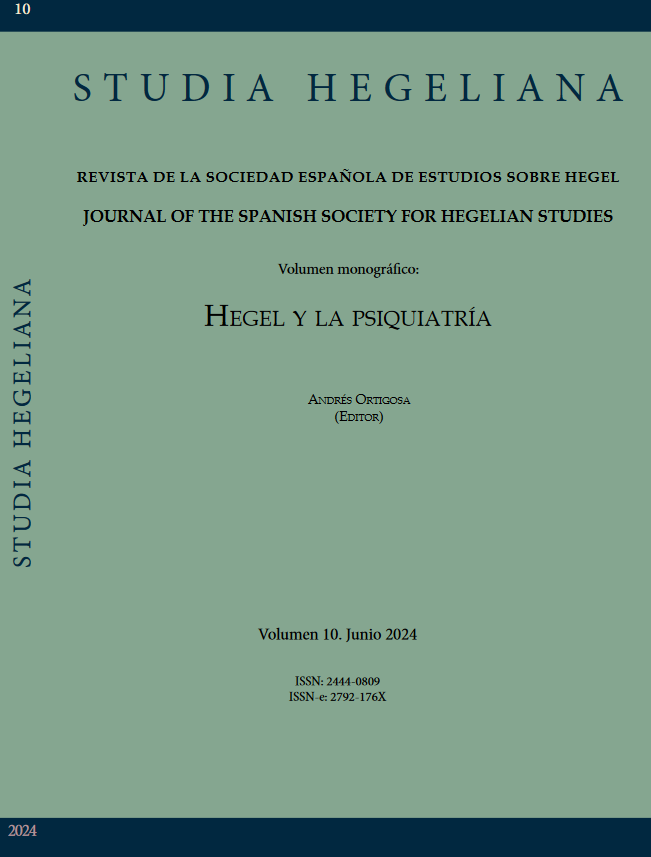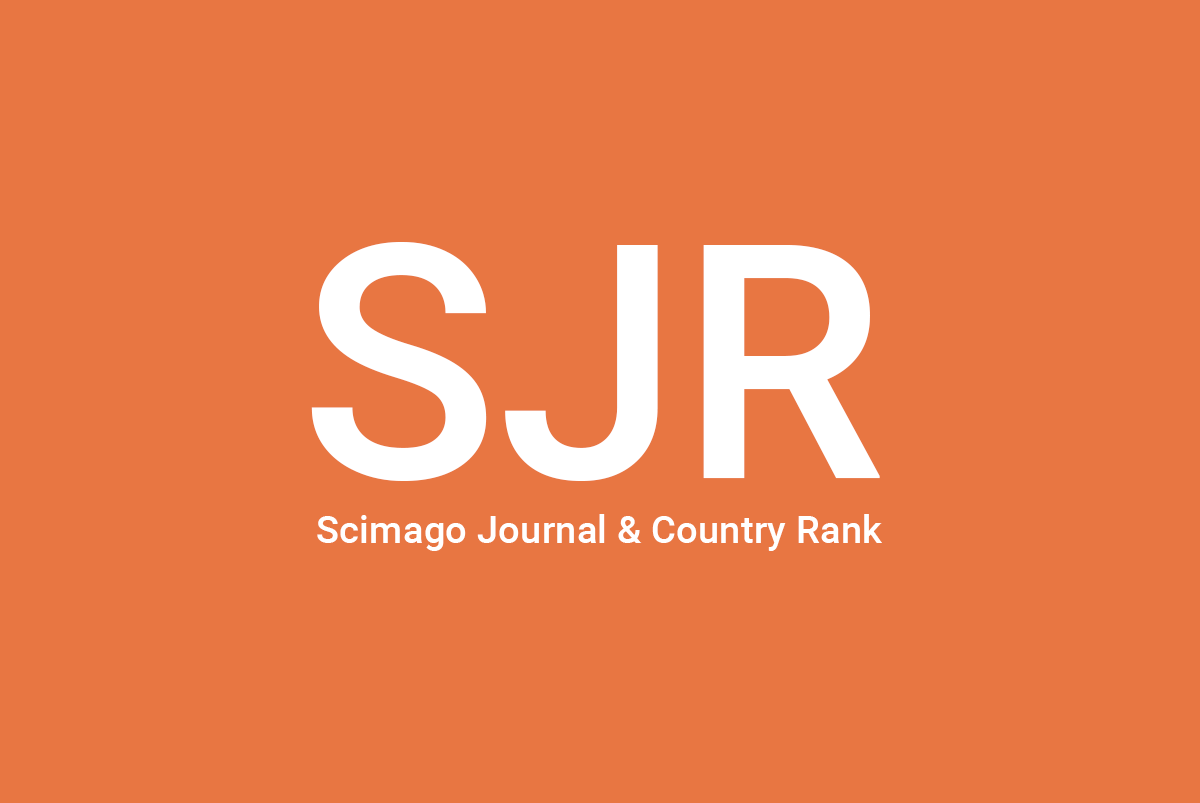Is the Psychiatrist a Good or Evil Genius for her Patient According to Hegel?
DOI:
https://doi.org/10.24310/stheg.10.2024.18126Palabras clave:
Conciencia, Genio, G.W.F. Hegel, Locura, PsiquiatríaResumen
En este artículo, sostengo que para comprender la teoría de Hegel sobre el tratamiento psiquiátrico, debemos enmarcar la relación entre el psiquiatra y su paciente utilizando el concepto de genio de Hegel tal como se desarrolla en la sección de Antropología de la Enciclopedia (§405). Como sostengo, esta noción de genio es a la vez compleja y ambigua, ya que Hegel presenta ejemplos tanto de genios buenos como de genios malos. Lo interesante es que el psiquiatra puede corresponder potencialmente a ambas figuras, lo que revela lo que quizás sea la mayor contribución de Hegel a la psiquiatría contemporánea como práctica: el imperativo del profesional de reflexionar sobre su propia motivación en el tratamiento, su propio posiciόn de autoridad y, por el contrario, la condición de sus pacientes.
Descargas
Métricas
Publicación Facts
Perfil de revisores N/D
Información adicional autores
Indexado: {$indexList}
-
Indexado en
- Sociedad Académica/Grupo
- N/D
- Editora:
- Universidad de Málaga
Citas
Berthold-Bond, Daniel. Hegel’s Theory of Madness. Albany: SUNY Press, 1995.
Bichat, Xavier. Recherches physiologiques sur la vie et la mort, Verviers, Marabout, 1973.
Burdach, Karl Friedrich, Propädeutik zum Studium der gesammten Heilkunst, Leipzig, Breitkopf & Härtel, 1800.
Chaput, Emmanuel, « Hegel lecteur de Bichat, ou comment la raison spéculative fait d’une distinction d’entendement un moment conceptuel du vivant », Symposium, vol.22, no.1, Printemps/Spring 2018, p.159-186.
Chaput, Emmanuel. “Madness, Habit and the Genius. On Hegel’s Theory of Embodiment”, Idealistic Studies, vol.53, no.2, 2023, p.99-128. DOI: 10.5840/idstudies20231026156
Chaput, Emmanuel, « S’éduquer à travers l’autre : philosophie du perfectionnement, humanisme et conscience de soi chez G.W.F. Hegel et Germaine de Staël », Cahiers Staëliens, no.73, 2023, p.51-76.
DeVries, Willem A., Hegel’s Theory of Mental Activity, Ithaca, Cornell University Press, 1988.
Dryden, Jane. “Hegel’s Anthropology: Transforming the Body”. In Hegel’s Encyclopedia of the Philosophical Science, ed., Sebastian Stein & Joshua I. Wretzel, 127-47, Cambridge: Cambridge University Press, 2021.
Ferrarin, Alfredo, Hegel and Aristotle, Cambridge, Cambridge University Press, 2004.
Greene, Murray. Hegel on the Soul. The Hague: Martinus Nijhoff, 1972.
Hegel, G.W.F. Gesammelte Werke. Im Auftraf der Deutschen Forschungsgemeinshaft hrsg. v. der Rheinisch-Westfälischen Akademie der Wissenschaften, Hamburg: Meiner 1968ss.
G.W.F. Hegel, Philosophy of Mind, trans. W. Wallace & A.V. Miller, Oxford, Oxford University Press, 1971
Janssen, Diederik F. “Naming Psychiatry: Apropos Earliest Use oft he Term by Karl Friedrich Burdach (1800)”, History of Psychiatry, vol.34, no.3, 2023, 231-48.
Kraepelin, Emil, Einführung in die psychiatrische Klinik, Leipzig, Johann Ambrosius Barth, 1901.
Kring, Ann M. et al. Abnormal Psychology. Hoboken: Wiley, 2010.
Locke, John, An Essay concerning Human Understanding, Oxford, Oxford University Press, 1985.
Magee, Glenn Alexander. “The Dark Side of Subjective Mind.” In Essays on Hegel’s Philosophy of Subjective Spirit, edited by David S. Stern, 55-69. Albany: SUNY Press, 2013.
McGrath, Sean J., “Madness as a Philosophical Problem in Hegel”. In Mad/Bad/Sad: Philosophical, Political, Poetic and Artistic Reflections on the History of Madness, edited by Gonzalo Araoz, Leyden, Brill, 2012, 27-33
Mowad, Nicholas. “Awakening to Madness and Habituation to Death in Hegel’s ‘Anthropology’.” In Essays on Hegel’s Philosophy of Subjective Spirit, edited by David S. Stern, 87-105. Albany: SUNY Press, 2013.
Novakovic, Andeja. “Hegel’s Anthropology.” In The Oxford Handbook of Hegel, edited by Dean Moyar, 407-23. Oxford: Oxford University Press, 2023.
Reid, Jeffrey. Real Words. Language and System in Hegel. Toronto: University of Toronto Press, 2007.
Reid, Jeffrey. “How the Dreaming Soul Became the Feeling Soul.” In Essays on Hegel’s Philosophy of Subjective Spirit, edited by David S. Stern, 37-54. Albany: SUNY Press, 2013.
Reil, J.C., Rhapsodieen über die Anwendung der psychischen Curmethode auf Geisteszurrüttengen, Halle, Curtschen Buchhandlung, 1803.
Reil, J.C. „Über den Begriff Medicin und ihre Verzweigugen, besonders in Beziehung auf die Berichtigung der Topik der Psychiaterie“, Beyträge zur Beförderung einer Kurmethode auf psychischem Wege, no.1, 1808, p.161-279.
Richards, Robert J. The Romantic Conception of Life, Chicago, The University of Chicago Press, 2002.
Tubbs, Nigel. “Hegel’s Educational Theory and Practice”, British Journal of Educational Studies 44, no. 2 (1996), 181-99.
Wenning, Mario. “Awakening from Madness” In Essays on Hegel’s Philosophy of Subjective Spirit, edited by David S. Stern, Albany: SUNY Press, 2013, 107-19
Descargas
Publicado
Cómo citar
Número
Sección
Licencia
Derechos de autor 2024 Emmanuel Chaput

Esta obra está bajo una licencia internacional Creative Commons Atribución-NoComercial-CompartirIgual 4.0.
Esta revista provee acceso libre inmediato a su contenido bajo el principio de hacer disponible gratuitamente la investigación al público. Todos los contenidos publicados en Studia Hegeliana. Revista de la Sociedad Española de Estudios sobre Hegel, están sujetos a la licencia Creative Commons Reconocimento-NoComercia-Compartirigual 4.0 (específicamente, CC-by-nc-sa) cuyo texto completo puede consultar en <http://creativecommons.org/licenses/by-nc-sa/4.0>. Por ello, se permite la generación de obras derivadas siempre que no se haga un uso comercial. Tampoco se puede utilizar la obra original con finalidades comerciales. La revista no se hace responsable de las opiniones vertidas por lo autores de los trabajos que en ella se publican.
Es responsabilidad de los autores/as obtener los permisos necesarios de las imágenes que están sujetas a derechos de autor.
Los autores/as cuyas contribuciones sean aceptadas para su publicación en esta revista conservarán el derecho de autor. Este es no exclusivo de utilizar sus contribuciones con fines académicos, de investigación y educativos, incluyendo el auto-archivo o depósito en repositorios de acceso abierto de cualquier tipo.
Desde el volumen 7 de 2021 la revista Studia Hegeliana ha modificado el copyright. Desde ese año, los autores son los que conservan los derechos de autor.
La edición electrónica de esta revista esta editada por la Editorial de la Universidad de Málaga (UmaEditorial), siendo necesario citar la procedencia en cualquier reproducción parcial o total.







243.png)






















